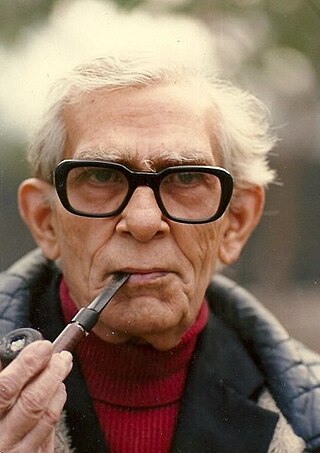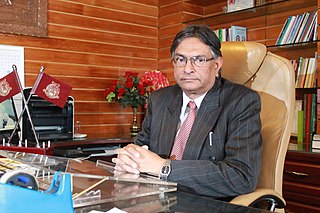
Jamia Millia Islamia is a premier central university located in New Delhi, India. Originally established at Aligarh, United Provinces during the British Empire in 1920, it moved to its current location in Okhla in 1935. It was given the deemed status by University Grants Commission in 1962. Jamia Millia Islamia became a central university in the year 1988 by an act of the Indian Parliament which was passed on December 26, 1988.

Mukhtar Ahmed Ansari was an Indian nationalist and political leader, and former president of the Indian National Congress and the Muslim League during the Indian Independence Movement. He was one of the founders of Jamia Millia Islamia University. He remained it's chancellor from 1928 to 1936.

Saifuddin Kitchlew was an Indian independence activist, barrister, politician and later a leader of the peace movement. A member of Indian National Congress, he first became Punjab Provincial Congress Committee head and later the General Secretary of the All India Congress Committee in 1924. He is most remembered for the protests in Punjab after the implementation of Rowlatt Act in March 1919, after which on 10 April, he and another leader Satyapal, were secretly sent to Dharamsala. A public protest rally against their arrest and that of Gandhi, on 13 April 1919 at Jallianwala Bagh, Amritsar, led to the infamous Jallianwala Bagh massacre. He was also a founding member of Jamia Millia Islamia. He was awarded the Stalin Peace Prize in 1952.
Yoginder Singh Sikand is an Indian writer and academic who has written several books on Islam-related issues in India.
Mushirul Hasan was a historian of modern India. He wrote on the partition of India, communalism, and on the history of Islam in South Asia.

Syed Asghar Wajahat, popularly known as Asghar Wajahat, is a Hindi scholar, fiction writer, novelist, playwright, an independent documentary filmmaker and a television scriptwriter, who is most known for his work, 'Saat Aasmaan' and his acclaimed play, 'Jis Lahore Nai Dekhya, O Jamyai Nai', based on the story of an old Punjabi Hindu woman who gets left behind in Lahore, after the Partition of India, and then refuses to leave.
A.J.K. Mass Communication Research Centre is a mass communication research centre located in New Delhi, India and a constituent institute of the Jamia Millia Islamia. The full form for AJK MCRC is Anwar Jamal Kidwai Mass Communication Research Centre named after its founder Anwar Jamal Kidwai in 1982.

Najeeb Jung is a retired Indian Administrative Service officer who served as the 20th Lieutenant Governor of Delhi from July 2013 to December 2016. He previously served as the 13th Vice-Chancellor of the Jamia Millia Islamia from 2009 to 2013.
Mohammad Ishaq Khan was a historian of Kashmir. He was Dean Academics, Dean, Faculty of Social Sciences and Head, Department of History at Kashmir University. After his superannuation in 2005, he became the Director of the newly founded Centre for Kashmir Studies and later held the Shaikhul Alam Chair at Kashmir University until August 2008.

Mushtaq Ahmed Azmi, was a mass literacy expert. He was one of the first non-officials to be associated with the development of Adult Education program in India from the early 1950s, and was an early leader of the mass literacy movement. As an officer of UNESCO, he was posted in Africa and seconded to lead mass literacy programs in Nigeria and Zambia. He was offered a position in the UNESCO by the British diplomat and head of fundamental education at UNESCO John Bowers.

Talat Ahmad is an Indian Earth Scientist, former Professor at the Department of Geology, University of Delhi and served as Indian National Science Academy (INSA) Senior Scientist. He served as Chairman of Governing body which oversees Wadia Institute of Himalayan Geology, Dehradun from 1 December 2021 and served the office till 30 November 2027. Previously, he commenced his second stint as vice chancellor of University of Kashmir on 6 August 2018 and served the office till 20 May 2022. Before that, he served as Vice chancellor of Jamia Millia Islamia, he resigned from the post a few months short of his full term. He was shortlisted by a committee constituted by the governor to shortlist a panel for the post. He had earlier taken over as Vice-chancellor of University of Kashmir from Professor Riyaz Punjabi on 1 June 2011. Prior to this, he was teaching Geology at the University of Delhi.
Akhtarul Wasey is an Indian scholar and academician, who serves as the president of Maulana Azad University, in Jodhpur, India. He formerly served as professor of Islamic Studies at Jamia Millia Islamia in New Delhi, where he remains professor emeritus in the Department of Islamic Studies.
Mansoor Hasan Khan, is an Indian cardiologist, known for his contributions towards the setting up of Lari Cardiology Centre at King George's Medical University, Lucknow. The Government of India honored Hasan in 2011, with the fourth highest civilian award of Padma Shri.
Farida Abdulla Khan is currently a professor in the Department of Educational Studies at Jamia Millia Islamia (JMI), Delhi, India. She is also the managing editor of Contemporary Dialogue in Education by Sage. Earlier, She was a former Dean of Education at JMI.
Furqan Qamar is a former vice-chancellor of University of Rajasthan and first vice-chancellor of Central University of Himachal Pradesh. Earlier he was associated with Association of Indian Universities. Professor Furqan Qamar, was the Secretary General of the Association of Indian Universities, i.e. the principal executive officer of the largest and one of the oldest network of universities. He has also served as Advisor (Education) in the Planning Commission of India.
Zafar Ahmad Nizami was an Indian author, poet and writer. He served the Jamia Millia Islamia as Professor of Political Science for about 30 years and authored books like Memarān-e-Jamia, Hindustān ke chand Siyasi Rahnuma, Maulana Azad Ki Kahani and Tarīkh-e-Hind: Ahd-e-Jadeed.

The Jamia Millia Islamia attack refers to the forceful entry by Delhi police into the Jamia Millia Islamia university during a confrontation with student protesters that started outside the campus on 15 December 2019. Hundreds of police officers forcefully entered the campus and detained more than a hundred students during the confrontation with the protesters. The police used batons and tear gas to disperse protesters. The police also entered the university library and washrooms and in the process of the violence ransacked parts of it. The visuals of students being dragged and assaulted by the police were telecast by news channels. About two hundred people were injured and were admitted to AIIMS and the Holy Family Hospital.

Muḥammad Ijteba Nadwi was an Indian Islamic scholar, who formerly headed the Arabic departments of Jamia Millia Islamia, Kashmir University and the Allahabad University.








